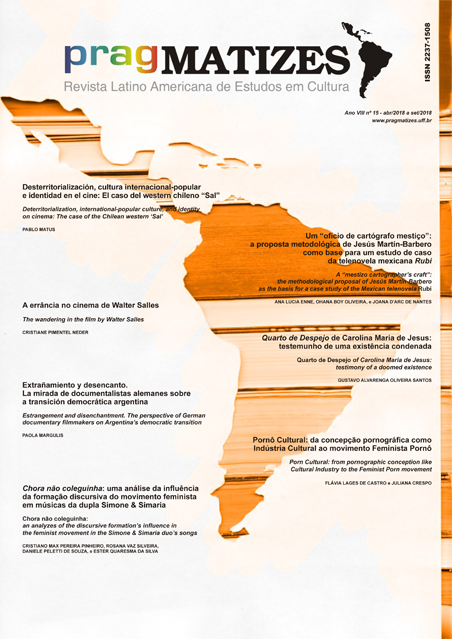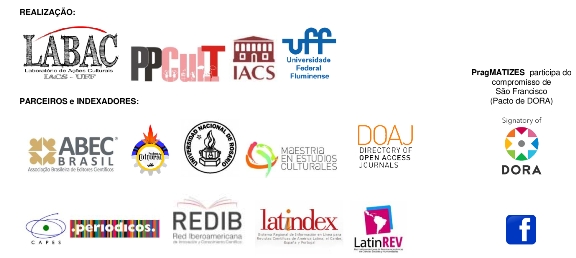Desterritorialización, cultura internacional-popular e identidad en el cine: El caso del western chileno “Sal”
DOI:
https://doi.org/10.22409/pragmatizes.v0i15.10511Resumen
El presente artículo dialoga con la tradición de estudio cultural asociado a la producción de bienes simbólicos, particularmente respecto de las formas de representación de la identidad local latinoamericana presentes en objetos mediales de distribución globalizada. En este caso se tomará como pieza de análisis el filme chileno “Sal” (2012), que se declara como perteneciente al género del western y posee un argumento acorde con el canon reconocible al mismo, pero fue dirigida por un argentino (Diego Rougier), protagonizada por un español (Fele Martínez) y chilenos (Patricio Contreras y Javiera Contador, entre otros), y cuenta con locaciones en España y Chile. Para enfrentar el análisis se emplean principalmente conceptos del sociólogo brasileño Renato Ortiz respecto de la globalización y la mundialización, así como de lo que lo que él llama desterritorialización y cultura internacional-popular.Descargas
Citas
ALIM, H. Sami; IBRAHIM, Awad; PENNYCOOK, Alastair (Eds.). Global linguistic flows: Hip-hop cultures, youth identities, and the politics of language. Nueva York: Routledge, 2009.
BAUMAN, Zygmunt. La globalización. Consecuencias humanas. Ciudad de México: Fondo de Cultura Económica, 2010.
CAMPBELL, Joseph. El héroe de las mil caras. Psicoanálisis del mito. Ciudad de México: Fondo de Cultura Económica, 1959.
CASTELLS, Manuel. La era de la información. Economía, sociedad y cultura. (Vol. 1, La sociedad red). Ciudad de México: Siglo XXI, 1999.
CASTLES, Stephen; DAVIDSON, Alastair. Citizenship and migration. Globalization and the politics of belonging. Londres: Macmillan, 2000.
CHAREONWONGSAK, Kriengsak. Globalization and technology: How will they change society? Technology in Society, ano 24, n. 3, 2002.
DEMONT-HEINRICH, Christof. Cultural imperialism versus globalization of culture: Riding the structure-agency dialectic in global communication and media studies. Sociology Compass, ano 5, n. 8, 2011.
GARCÍA CANCLINI, Néstor. Culturas híbridas. Buenos Aires: Paidós, 2001.
GARCÍA CANCLINI, Néstor. Lectores, espectadores e internautas. Barcelona: Gedisa, 2007.
GRANT, Barry Keith. Film genre. From iconography to ideology. Londres: Wallflower, 2007.
GREIMAS, Algirdas Julien. Semántica estructural. Investigación metodológica. Madrid: Gredos, 1987.
HALL, Stuart. Cultural identity and cinematic representation. Framework, n. 36, 1989.
HALL, Stuart; JEFFERSON Tony (Eds.). Resistance through rituals. Youth subcultures in postwar Britain. Londres: Routledge, 1993.
INGLEHART, Ronald. Globalization and postmodern values. The Washington Quarterly, ano 23, n. 1, 2000.
JENSEN, Tommy; SANDSTRÖM, Johan. Stakeholder theory and globalization: The challenges of power and responsibility. Organization Studies, ano 32, n. 4, 2011.
KRAIDY, Marwan. Globalization of culture through the media. IN: SCHEMENT, Jorge Reina (Ed.), Encyclopedia of communication and information, Vol. 2. Nueva York: Macmillan Reference, 2002, P. 359-363.
KÜTTING, Gabriela. Globalization and the environment. Greening global political economy. Albany: State University of New York, 2004.
LANGFORD, Barry. Film genre. Hollywood and beyond. Edimburgo: Edinburgh University, 2005.
LIGHT, Duncan. Dracula tourism in Romania: Cultural identity and the state. Annals of Tourism Research, ano 34, n. 3, 2007.
LIZARDO, Omar. Understanding the flow of symbolic goods in the global cultural economy. International Journal of Contemporary Sociology, ano 45, n. 1, 2008.
LUHMANN, Niklas. Ecological communication. Chicago: University of Chicago, 1989.
LUHMANN, Niklas. Globalization or world society: How to conceive of modern society? International Review of Sociology, ano 7, n. 1, 1997.
MAYER, Vicki. Living telenovelas/telenovelizing life: Mexican American girls’ identities and transnational telenovelas. Journal of Communication, ano 53, n. 3, 2003.
MCLUHAN, Marshall; POWERS, Bruce R. La aldea global. Barcelona: Gedisa, 1995.
MCMAHON, Jennifer; CSAKI, Steve. Introduction: Philosophy and the western. IN: MCMAHON, Jennifer; CSAKI, Steve (Eds.), The philosophy of the western. Lexington: University of Kentucky, 2010, P. 1-10.
ORTIZ, Renato. Mundialización y cultura. Bogotá: Convenio Andrés Bello, 2004.
OUGAARD, Morten. Political globalization: State, power, and social forces. Nueva York: Palgrave Macmillan, 2004.
PARSONS, Talcott. The social system. Nueva York: The Free Press of Glencoe, 1959.
RITZER, George (Ed.). The Blackwell companion to globalization. Malden: Blackwell, 2007.
TAYLOR, Jessica. Romance and the female gaze obscuring gendered violence in the Twilight Saga. Feminist Media Studies, ano 14, n. 3, 2014.
TICKNER, Arlene. Aquí en el ghetto: Hip-hop in Colombia, Cuba, and Mexico. Latin American Politics and Society, ano 50, n. 3, 2008.
TURNER, Graeme. Cultural identity, soap narrative, and reality TV. Television & New Media, ano 6, n. 4, 2005.
WILLIAMS, Raymond. Television: Technology and cultural form. Londres: Collins, 1974.
##submission.downloads##
Publicado
Cómo citar
Número
Sección
Licencia
Autores que publican en esta revista están de acuerdo con os siguientes términos:
- Autores mantienen los derechos autorales y conceden a la revista el derecho de propiedad, con el trabajo simultáneamente estando licenciado bajo Licencia Creative Commons Attribution que permite el compartimiento del trabajo con reconocimiento de la autoría y publicación inicial en esta revista.
- La revista se reserva el derecho de efectuar, en los originales, alteraciones de orden normativo, ortográfico y gramatical.
- Las pruebas finales no serán presentadas a los autores.
- Las opiniones emitidas por los autores son de su exclusiva responsabilidad.



